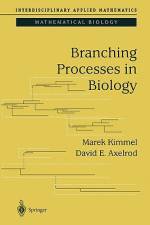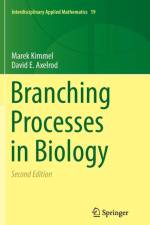von Marek Kimmel & David E. Axelrod
75,00 €
This book provides a theoretical background of branching processes and discusses their biological applications. Branching processes are a well-developed and powerful set of tools in the field of applied probability. The range of applications considered includes molecular biology, cellular biology, human evolution and medicine. The branching processes discussed include Galton-Watson, Markov, Bellman-Harris, Multitype, and General Processes. As an aid to understanding specific examples, two introductory chapters, and two glossaries are included that provide background material in mathematics and in biology. The book will be of interest to scientists who work in quantitative modeling of biological systems, particularly probabilists, mathematical biologists, biostatisticians, cell biologists, molecular biologists, and bioinformaticians. The authors are a mathematician and cell biologist who have collaborated for more than a decade in the field of branching processes in biology for this new edition.This second expanded edition adds new material published during the last decade, with nearly 200 new references. More material has been added on infinitely-dimensional multitype processes, including the infinitely-dimensional linear-fractional case. Hypergeometric function treatment of the special case of the Griffiths-Pakes infinite allele branching process has also been added. There are additional applications of recent molecular processes and connections with systems biology are explored, and a new chapter on genealogies of branching processes and their applications.Reviews of First Edition:"e;This is a significant book on applications of branching processes in biology, and it is highly recommended for those readers who are interested in the application and development of stochastic models, particularly those with interests in cellular and molecular biology."e; (Siam Review, Vol. 45 (2), 2003)"e;This book will be very interesting and useful for mathematicians, statisticians and biologists as well, and especially for researchers developing mathematical methods in biology, medicine and other natural sciences."e; (Short Book Reviews of the ISI, Vol. 23 (2), 2003)


